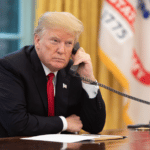
In a significant policy shift, President Donald Trump has rescinded a 2023 executive order from his predecessor, Joe Biden, designed to manage artificial intelligence (AI) risks.
Reuters reported that the revocation reflects the Republican stance that promotes AI progress and free expression, aligning with their 2024 platform.
Trump's decision to overturn the order, which took place on January 20, marks a pivotal moment in the ongoing debate over the regulation of AI technologies. The original executive order issued by Biden aimed to address various safety concerns arising from advanced AI systems.
It directed AI developers to share safety test results with the federal government, in compliance with the Defense Production Act, especially for technologies that might pose threats to national security, economic stability, or public health.
Biden's executive order had set forth detailed guidelines for AI developers. These included the submission of testing data to ensure that the technologies were safe and would not adversely affect the U.S. economy, national security, or citizens' well-being.
Moreover, it mandated federal agencies to establish testing standards aimed at countering various risks, including those surrounded by chemical, biological, nuclear, and cyber threats.
By removing this executive action, Trump aligns closely with the Republican Party's approach, which argues that such restrictions could impede technological advancements. The party's 2024 platform explicitly called out the earlier order, suggesting it stifled AI innovation.
The Republican Party advocates for innovations that underline free speech and the well-being of humanity. Their platform states, "Republicans support AI development rooted in free speech and human flourishing."
The withdrawal of Biden's directive has sparked a broader conversation about the role of regulation in technological innovation.
The AI sector has seen rapid growth, raising alarms about possible negative impacts like job displacement, among other societal implications. Critics of overly stringent regulations argue that they might slow down the pace of this burgeoning field.
Within days of the revocation, debates intensified about the balance between fostering innovation and ensuring safety.
Proponents of relaxed regulations emphasize that reduced government oversight can lead to greater technological freedom and competitiveness on the global stage. They argue that innovation thrives best in environments that encourage creativity and exploration without heavy-handed governmental intervention.
Yet, concerns remain among analysts about the potential repercussions of deregulating AI, particularly in areas affecting national security and economic infrastructure.
The shift in policy comes amid other significant moves by the U.S. government concerning AI and technology. Just last week, the U.S. Commerce Department initiated new restrictions on the export of AI chips and related technology.
This decision was met with criticism from industry leaders, including Nvidia, who voiced concerns that such measures could hurt the competitiveness of U.S. firms.
Despite these new export restrictions, the AI industry continues to grapple with the tensions between regulation and innovation. Technology companies often find themselves at the crossroads of advancing their developments while adhering to government policies aimed at protecting national interests.
Interestingly, in the same week, former President Biden issued another executive order focusing on AI data centers. This order sought to enhance the energy infrastructure necessary to support these expansive facilities. Notably, President Trump chose not to rescind this particular order, suggesting a nuanced approach to AI-related policies.
The revocation opens the door wider for AI developers, supposedly without the cumbersome regulatory requirements previously in place. As AI continues to revolutionize diverse fields—from healthcare to autonomous driving—the implications of such policy changes are vast.
The debate over AI governance is likely to continue, with stakeholders from various sectors and political spectrums voicing diverse opinions.
On one hand, there is a push to accelerate AI advancements without constraints, while on the other, there is a call for ensuring comprehensive oversight to preclude potentially harmful consequences.
For the AI industry, Trump's revocation might translate into fewer bureaucratic hurdles, potentially accelerating innovation. However, the responsibility now might shift more towards companies to self-regulate and ensure the safety and reliability of their AI systems.
As policymakers and industry leaders navigate this evolving landscape, the discourse will focus on striking a balance that allows AI technologies to flourish while safeguarding societal interests.
The revocation underscores the ideological divide between fostering innovation and regulating for safety. As the sector moves forward, the era of AI might define new norms around technological progress, regulatory frameworks, and ethical considerations.



